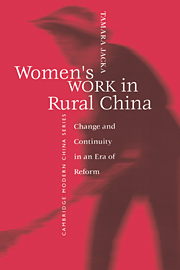Book contents
- Frontmatter
- Contents
- List of Tables
- Acknowledgements
- Abbreviations
- Introduction
- 1 Theorising gender
- 2 Patterns from the past
- 3 Post-Mao reforms
- 4 Families
- 5 Education and politics
- 6 Domestic work
- 7 Agriculture
- 8 Entrepreneurs on the farm
- 9 Industry
- 10 Conclusion
- Appendix 1 Summary of information on sample families in rural Beijing, Shandong and Sichuan
- Appendix 2 Employment in sample township enterprises in rural Beijing, Shandong and Sichuan
- Notes
- Bibliography
- Index
Introduction
Published online by Cambridge University Press: 20 March 2010
- Frontmatter
- Contents
- List of Tables
- Acknowledgements
- Abbreviations
- Introduction
- 1 Theorising gender
- 2 Patterns from the past
- 3 Post-Mao reforms
- 4 Families
- 5 Education and politics
- 6 Domestic work
- 7 Agriculture
- 8 Entrepreneurs on the farm
- 9 Industry
- 10 Conclusion
- Appendix 1 Summary of information on sample families in rural Beijing, Shandong and Sichuan
- Appendix 2 Employment in sample township enterprises in rural Beijing, Shandong and Sichuan
- Notes
- Bibliography
- Index
Summary
IN 1978 the Chinese Communist Party (CCP) embarked upon a new path toward modernisation and development, rejecting much that was central to the previous Maoist political philosophy, and implementing a range of reform policies. Through the course of the 1980s and 1990s these policies have engendered major social, political and economic changes. Not the least of these has been a greater degree of openness, which has allowed for new opportunities for social scientists in China and elsewhere to observe change in Chinese society, and to theorise about how such change occurs. Scholars have, for example, analysed the interactions between different interest groups and how these shape politics and economic change; the relationship between political or ideological reforms and changes in the economy; and the effect of economic reforms on different sectors of society and how these in turn feed back into reforms.
A number of valuable studies of gender relations in the post-reform period have been published, drawing our attention to the fact that in a general sense Chinese women have not benefited from the process of reform to the same extent as men, and that in numerous ways the subordination of women has been reinforced and increased since the reforms were introduced. An issue that remains problematic, however, is that of the mechanics of change in gender relations.
- Type
- Chapter
- Information
- Women's Work in Rural ChinaChange and Continuity in an Era of Reform, pp. 1 - 9Publisher: Cambridge University PressPrint publication year: 1997

